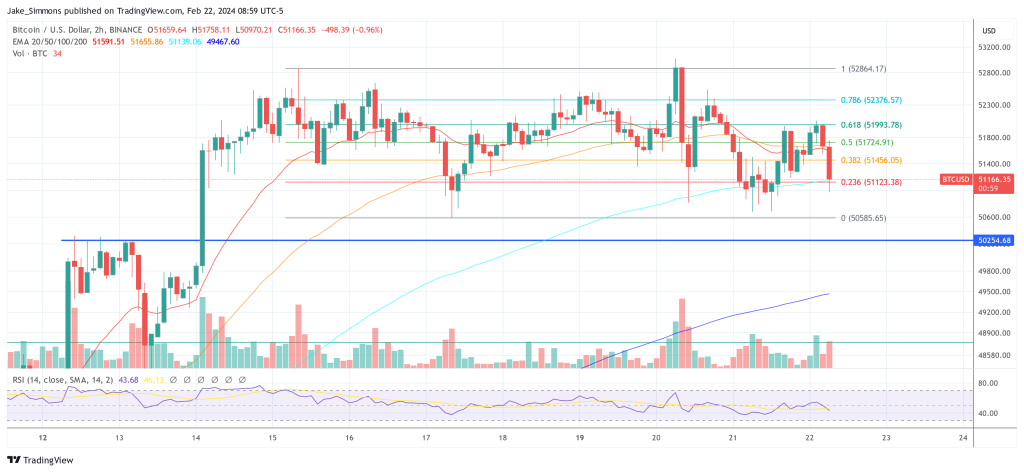ARTICLE AD BOX
In a recent blog post on The ECB Blog, European Central Bank officials Ulrich Bindseil and Jürgen Schaaf delivered a scathing critique of Bitcoin, asserting that it has failed to fulfill its promise as a global decentralized digital currency. The post, titled “ETF approval for bitcoin – the naked emperor’s new clothes,” was published on February 22, 2024, and comes in the wake of the US Securities and Exchange Commission’s (SEC) approval of spot exchange-traded funds (ETFs).
ECB Tries Once Again To Defame Bitcoin
The ECB’s statement on X (formerly Twitter) summarized the blog’s sentiment, stating, “Bitcoin has failed to become a global decentralised digital currency, instead falling victim to fraud and manipulation. The recent approval of an ETF doesn’t change the fact that Bitcoin is costly, slow and inconvenient.”
Bitcoin has failed to become a global decentralised digital currency, instead falling victim to fraud and manipulation.
The recent approval of an ETF doesn’t change the fact that Bitcoin is costly, slow and inconvenient, argues #TheECBBloghttps://t.co/e9Ek01Dism pic.twitter.com/ddBFsv4g0w
— European Central Bank (@ecb) February 22, 2024
Bindseil and Schaaf argue that BTC has not become widely used for legitimate transfers and is not suitable as a means of payment or an investment. They criticize the cryptocurrency for not generating any cash flow, dividends, or social benefits, and for being an instrument of environmental harm due to the energy-intensive proof of work mechanism used in mining.
Despite the SEC’s approval of BTC spot ETFs, which was seen by many as a validation of the cryptocurrency’s investment safety and a precursor to a rally, the ECB officials maintain that Bitcoin’s “fair value remains zero.”
They call the recent BTC price rally a “dead cat bounce” and point to the speculative nature of BTC’s price increases and warn of the potential for a renewed boom-bust cycle that could have significant collateral damage, including environmental harm and redistribution of wealth at the expense of less sophisticated investors.
The blog post also addresses the use of Bitcoin for illicit activities, noting the continued rise in transactions associated with money laundering, terrorism financing, and ransomware attacks. The ECB officials criticize the regulatory approaches in both Europe and the United States, suggesting that Bitcoin’s decentralized nature has led to a regulatory fatalism that has not effectively combated these issues.
Furthermore, the blog highlights the irony of BTC, a cryptocurrency that aimed to bypass traditional financial systems, relying on conventional intermediaries like ETFs to attract a broader group of investors. The authors argue that this underscores the speculative and unproductive nature of BTC as an asset.
The blog post concludes, “Bitcoin’s price level is not an indicator of its sustainability. There is no economic fundamental data, there is no fair value from which serious forecasts can be derived. There is no “proof of price” in a speculative bubble. […]. The “market” capitalisation quantifies the overall social damage that will occur when the house of cards collapses.”
The Bitcoin Community Reacts
The ECB’s latest critique has ignited a firestorm of reactions from the community. Several prominent voices within the Bitcoin ecosystem have come forward to challenge the ECB’s views.
James Butterfill, Head of Research at Coin Shares, expressed disbelief at the ECB’s stance, remarking, “The ECB is beginning to look like a bit of a joke in its understanding of BTC as an asset, and its impact on the environment too.”
Alessandro Ottaviani offered a pointed critique of the ECB’s previous assessments of Bitcoin, highlighting the cryptocurrency’s significant price appreciation since the ECB’s November 2022 article which claimed BTC was on a “road to irrelevance.”
Ottaviani stated, “ECB wrote an article in November 2022 stating ‘Bitcoin is embarking on a road to irrelevance’. Meanwhile Bitcoin was at $17k and now it is at $52k (+205%). They were wrong 15 months ago, and they are wrong now. Time will prove it. Bitcoin is the best form of money humanity has ever had, it is not on the irreversible path to become global store of value.”
Daniel Batten, managing partner at CH4 Capital, took a more humorous approach in his response, highlighting the misinterpretation and misunderstanding surrounding Bitcoin’s utility and adoption. Batten sarcastically thanked the ECB for their “entertainment,” suggesting their analysis missed the mark on BTC’s actual status and potential as a decentralized digital currency and investment asset.
“Failed to be a global decentralized digital currency? Bitcoin has over 300 million users in just 15 years. In terms of user adoption, it’s growing faster than the Internet,” Batten pointed out, correcting the ECB’s underestimation of Bitcoin’s reach and impact.
Dan Held referred to the ECB’s own words from 2012, which make it obvious why the ECB is so hostile towards Bitcoin: fear of a monetary revolution.
The ECB wrote in 2012: “Bitcoin could have a negative impact on the reputation of central banks, assuming the use of such systems grows and in the event that an incident attracts the press, since the public may perceive the incident as being caused by a CB not doing its job properly”
At press time, BTC traded at $51,116.

.png)
 10 months ago
6
10 months ago
6








 English (US)
English (US)